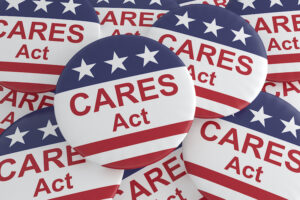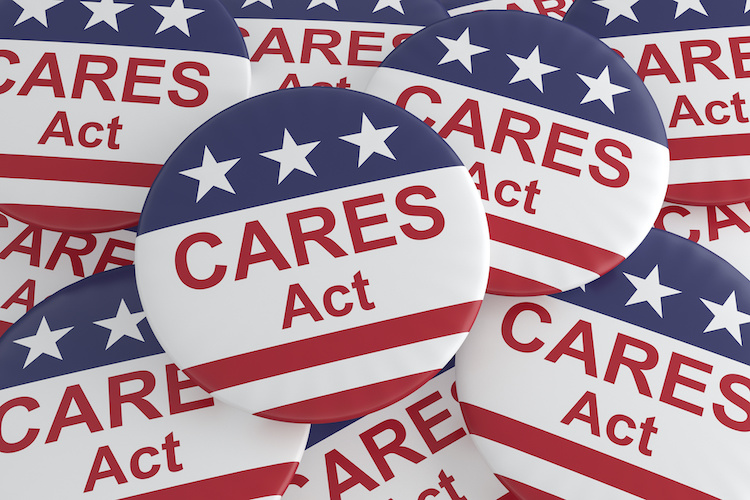 To help stabilize the U.S. economy in the wake of the COVID-19 pandemic, the CARES Act aims to boost the economy with $2 trillion in tax and non-tax emergency aid for individuals and businesses.
To help stabilize the U.S. economy in the wake of the COVID-19 pandemic, the CARES Act aims to boost the economy with $2 trillion in tax and non-tax emergency aid for individuals and businesses.
That package includes measures and appropriations to provide financial relief to businesses, individuals and families. The CARES Act, which was passed by Congress on March 27, is the third relief measure and follows the Families First Coronavirus Response Act and the Small Business Administration’s Economic Industry Disaster Loan Program.
The CARES Act is designed to assist businesses and individuals in addressing the economic hardships caused by the coronavirus pandemic. Following is an overview of key elements:
PROVISIONS FOR BUSINESSES
According to the Small Business Administration, the Paycheck Protection Program is designed to provide a direct incentive for small businesses to keep their workers on payroll by providing each small business a loan up to $10 million for payroll and certain other expenses. If all employees are kept on payroll for eight weeks, the SBA will forgive the portion of the loans used for payroll, rent, mortgage interest or utilities. Up to 100 percent of the loan is forgivable.
Small Business Loans
Generally, businesses with 500 employees or fewer are eligible for Small Business Administration emergency grants and the forgivable loan program. For guidance on applying, go here.
- Through the Paycheck Protection Program, the SBA will provide loans up to $10 million to qualified and eligible small businesses for up to 2.5 times the borrower’s average monthly payroll costs to assist in covering certain expenses, including payroll. The loans may be forgiven under the conditions set forth.
- Qualified small businesses that apply for a loan under the Economic Injury Disaster Loan Program due to COVID-19 will be eligible for SBA emergency grants of up to $10,000 to provide immediate relief for covered costs, including payroll, making rent or mortgage payments, and repaying obligations that cannot be met due to revenue losses.
- Small business development centers and women’s business centers may receive grants to assist in educating, training, and advising small businesses on various items such as accessing and applying for resources provided by the SBA.
Delaying Payment of Employer Payroll Taxes
The CARES Act allows some employers to defer payment of the employer share of the Social Security tax.
- All employers are responsible for paying the Federal Insurance Contributions Act (FICA) tax on employee wages.
- Deferred employment tax must be paid over the following two years, with half of the amount required by Dec. 31, 2021, and the other half by Dec. 31, 2022.
Employee Retention Credit
Some employers may be eligible to obtain a payroll tax credit for retaining employees during the pandemic. According to law firm Ogletree Deakins, Section 2301 of the CARES Act provides an employee retention credit for employers that are impacted due to the COVID-19 pandemic. This credit is in addition to the payroll tax credit provided under the Families First Coronavirus Response Act. Eligible employers providing emergency paid and sick leave to their employees affected by COVID-19 are allowed payroll tax credits.
- Eligible employers will be able to claim 50 percent of qualified wages paid up to $10,000 per employee.
- Several rules were established to determine eligibility for the credit. Businesses must be impacted by forced closures or quarantines and have seen a 50 percent drop or more in revenues in order to qualify.
- A business would not be eligible to take both this credit and a forgivable small business administration loan.
- The Treasury Department is likely to advance this credit in order to provide the funds back to employers more quickly.
PROVISIONS FOR INDIVIDUALS
Recovery Rebates
According to the U.S. Senate Finance Committee, all U.S. residents or citizens with adjusted gross income under $75,000 ($112,500 for head of household and $150,000 married), who are not the dependent of another taxpayer and have a work-eligible Social Security Number, are eligible for the full $1,200 ($2,400 married) rebate.
They are also eligible for an additional $500 per child. A typical family of four is eligible for a $3,400 recovery rebate. The provision allows for direct payments to individuals in two waves.
- Payments of $1,200 will be issued, with an additional $500 added for each dependent child, under age 17.
- These payments are based on the 2019 tax return filed, or the 2018 return if 2019 has not yet been filed.
- People with an adjusted gross income over $75,000 ($150,000 for married filing jointly) will have their rebate reduced by $5 for $100 over the threshold. Once adjusted gross income reaches $99,000 ($198,000 married filing jointly, $146,500 head of household), the rebate will no longer be applicable.
Unemployment Insurance Expansion
Federal Pandemic Unemployment Assistance in the amount of $600 per week may be provided to qualifying covered individuals in addition to any benefits currently offered by their state, as outlined in the CARES Act.
- Although benefits will vary by state, the expanded assistance provides an additional 13 weeks of unemployment benefits through Dec. 31, 2020, for covered workers who remain unemployed after the weeks of state unemployment compensation expire.
- Expanded unemployment compensation now includes those not traditionally eligible for those benefits under state or federal law such as self-employed individuals, independent contractors and those with limited work history who are unable to work as a direct result of a COVID-19 health emergency.
- Funding is provided to pay the first week cost of unemployment benefits through Dec. 31, 2020 for states that choose to pay recipients immediately upon becoming unemployed in lieu of the one-week waiting period before the individual becomes eligible for compensation benefits.
- Temporary financing to support “short-time compensation” programs will be provided for employers who opt to reduce employee hours rather than lay off workers. Employees with reduced hours will receive pro-rated unemployment benefits. The provision will pay 100 percent of the incurred costs to provide short-time compensation through Dec. 31, 2020.
Retirement Plan Relief
There also are provisions in the plan to provide tax relief to retirement-plan participants impacted by COVID-19. Key provisions to COVID-19 qualifying participants include:
- Allow in-service distributions.
- Remove early withdrawal penalty.
- Increase in loans available amount.
- Delay in loan repayments for COVID-19 participants with outstanding loans.
- Permit repayment period.
- Suspend the tax penalty on Required Minimum Distribution for retirement accounts for 2020.
This article was originally published on Workforce.com.















